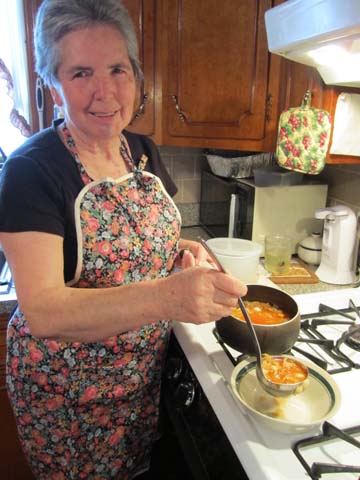Portuguese cuisine is often characterized by rich, filling, flavor-packed dishes that many will travel across the world to experience. Fortunately, for many of us in Ludlow, we can experience this in our own homes, where the ubiquitous, to-die-for smell conquers your nostrils and knocks you off your feet. One bite, and your cheeks cling to the combinations of flavor. Olive oil, dominant in almost every meal, splashes around your taste buds. Each meal, so delicate and delicious, created by a typical Portuguese family.
While Portuguese men are considered old fashioned, it’s the women who wear the pants when it comes to the kitchen. Aprons are donned as the first course begins to simmer. The ripest and fullest vegetables are stored on the table, picked earlier as the main ingredients for the mouth-watering vegetable soup.
An antiquated, dull knife never looks more natural than it does in the hand of a Portuguese grandmother. Grandmothers teach mothers, mothers teach daughters, and they bond together in the kitchen, as one cuts the vegetables, one blends the pumpkin or carrots, and one collects all the spices and beans.
Course two consists of the traditional salad of tomatoes, onions, cucumbers, and the coating of olive oil and vinegar. It’s made in minutes, and they make it look easy. Some might argue the skill of perfectly dicing each tomato so that not one seed falls out of place, chopping each cucumber into identical slices with only a few whacks, and hashing an onion without even looking, is a gift. But it’s actually years of practice.
The men aren’t completely useless when it comes to cooking. They take care of the most important part outside of the kitchen — the preparation the women do not have the stomach to handle.
Rabbit, or coelho — a tummy pleaser Portuguese folk can’t deny. Almost every old Portuguese man raises at least four rabbits, intending on turning them into a meal you’d rather be dead than miss.
As Grandpa walks to the back holding the stick, all the children flutter around begging, “Grandpa please don’t kill the bunny!” To which he replies, “Nao queres, nao comes!” (“Don’t want, don’t eat.”) The unlucky rabbit is taken to the back, and after one whack to the head, he’s ours.
The rabbit’s corpse is affixed to a string and dangled by his feet from a clothesline. With nothing more than a simple pocketknife, the fur and skin is stripped off the body from foot to head. The body, sliced and diced and soaked in its own blood, is placed in a pot, or panela, making its way over to the women, who hover in the doorway, ready to jump at the opportunity to cook it.
Grandparents, uncles, aunts, moms, dads, children, whatever the title, all combine together at the table as one. All the tension and anger seems to fade away as smiles occupy everyone’s faces.
The oldest male will always sit at the head of the table and cut and distribute each meal and dish before anyone else. The oldest woman won’t stay in her seat for more than two minutes; as she’s always grabbing something or serving someone beside herself, and never taking no for an answer when it comes to her offering a second helping. The women will always worry “will that stain?” as food falls on somebody’s shirt, the tablecloth, or the floor. And the children will debate whether or not orange Sumol is better than pineapple.
No matter what the memory may be, or what is eaten that day, it’s always remembered. The smiles, the laughs, the small pointless arguments, they become part of you. And one day, when you look back and recall everything that happened during the preparation of the meal or around that table, you’ll smile, because it’s those memories that will stick with you forever.


